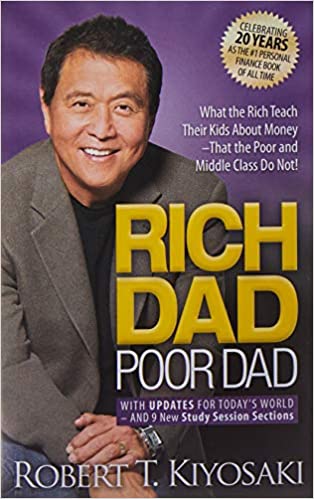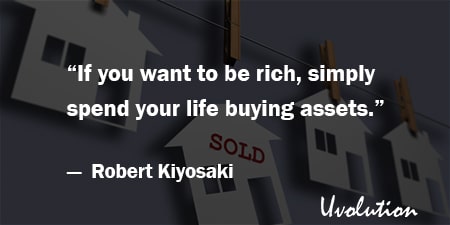Rich Dad Poor Dad by Robert Kiyosaki Book Summary
The Book in 1 Sentences
Rich Dad Poor Dad: What the Rich Teach Their Kids About Money That the Poor and Middle Class Do Not!
“One dad would say, ‘The love of money is the root of all evil.’ The other, ‘The lack of money is the root of all evil.’”
“One dad had a habit of saying, ‘I can’t afford it.’ The other dad forbade those words to be used. He insisted I say, ‘How can I afford it?’” ~ Robert Kiyosaki
9 BIG Ideas
Rich Dad Poor Dad Book Summary
1. Being a Victim
“Just know that it’s fear that keeps most people working at a job. The fear of not paying their
bills. The fear of being fired. The fear of not having enough money. The fear of starting over.
That’s the price of studying to learn a profession or trade, and then working for money. Most
people become a slave to money… and then get angry at their boss.”
“The poor and the middle class work for money. The rich have money work for them.”
T. Harv Eker -in his book Secrets of the Millionaire Mind- says: “You can be a victim or you can be rich, but you can’t be both. Listen up! Every time, and I mean every time, you blame, justify, or complain, you are slitting your financial throat.”
And remember that “The avoidance of money is just as psychotic as being attached to money.”
So, “Going into our fear and confronting our greed, our weaknesses, our neediness is the way out. And the way out is through the mind, by choosing our thoughts.”
2. Education is your greatest wealth
“I am concerned that too many people are focused too much on money and not on their greatest wealth, which is their education. If people are prepared to be flexible, keep an open mind and learn, they will grow richer and richer through the changes.
If they think money will solve the problems, I am afraid those people will have a rough ride. Intelligence solves problems and produces money. Money without financial intelligence is money soon gone.”
“I want to teach you to master the power of money. Not be afraid of it. And they don’t teach that in school. If you don’t learn it, you become a slave to money.”
“If you want to be rich, you need to be financially literate.”
3. Buy assets
“You must know the difference between an asset and a liability, and buy assets.”
“Rich people acquire assets. Poor and middle class acquire liabilities, but they think they are assets.”
“An asset is something that puts money in my pocket. A liability is something that takes money out of my pocket.”
“If you want to be rich, simply spend your life buying assets. If you want to be poor or middle class, spend your life buying liabilities. It’s not knowing the difference that causes most of the financial struggle in the real world.”
“The most important rule is to know the difference between an asset and a liability. Once you understand the difference, concentrate your efforts on only buying income-generating assets.”
4. Your house is a liability
“The greatest losses of all are those from missed opportunities. If all your money is tied up in your house, you may be forced to work harder because your money continues blowing out of the expense column, instead of adding to the asset column, the classic middle class cash flow problem.”
“This pattern of treating your home as an investment and the philosophy that a pay raise means you can buy a larger home or spend more is the foundation of today’s debt-ridden society.”
“The rich buy assets. The poor only have expenses. The middle class buys liabilities they think are assets.”
5. What is wealth?
“Wealth is a person’s ability to survive so many number of days forward… or if I stopped working today, how long could I survive?”
"The single most powerful asset we all have is our mind. If it is trained well, it can create enormous wealth in what seems to be an instant.”
6. Overcoming obstacles
“There are five main reasons why financially literate people may still not develop abundant asset columns:
1. Fear.
2. Cynicism.
3. Laziness.
4. Bad habits.
5. Arrogance.”
7. How are you handling your fear?
“We all have tremendous potential, and we all are blessed with gifts. Yet, the one thing that holds all of us back is some degree of self-doubt. It is not so much the lack of technical information that holds us back, but more the lack of self-confidence.”
“The fear of losing money is real. Everyone has it. Even the rich. But it’s not fear that is the problem. It’s how you handle the fear. It’s how you handle losing. It’s how you handle failure that makes the difference in one’s life. That goes for anything in life, not just money. The primary difference between a rich person and a poor person is how they handle that fear.”
“I recognized that it was excessive fear and self-doubt that were the greatest detractors of personal genius.”
“Life is much like going to the gym. The most painful part is deciding to go. Once you get past that, it’s easy.”
“I strongly urge students to learn to take risks, to be bold, to let their genius convert that fear into power and brilliance.”
8. Focus
“If you have little money and you want to be rich, you must first be ‘focused,’ not ‘balanced.’ If you look at anyone successful, at the start they were not balanced. Balanced people go nowhere. They stay in one spot. To make progress, you must first go unbalanced. Just look at how you make progress walking.”
Alexander Graham Bell: “Concentrate all your thoughts on the task at hand. The sun’s rays do not burn until brought to a focus.”
Thomas Edison: “The first requisite of success is the ability to apply your physical and mental energies to one problem without growing weary.”
T. Harv Eker: “The first thing I did was commit to my success and playing to win. I swore I would focus and not even consider leaving this business until I was a millionaire or more. This was radically different from my previous efforts, where, because I always thought short-term, I would constantly get side-tracked by either good opportunities or when things got tough.”
Seneca: “To be everywhere is to be nowhere.”
9. First "Give what you want"
“Whenever you feel ‘short’ or in ‘need’ of something, give what you want first and it will come back in buckets. That is true for money, a smile, love, friendship. I know it is often the last thing a person may want to do, but it has always worked for me. I just trust that the principle of reciprocity is true, and I give what I want.”
Deepak Chopra’s wisdom - in The Seven Spiritual Laws of Success-says: “Practicing the Law of Giving is actually very simple; if you want joy, give joy to others; if you want love, learn to give love; if you want attention and appreciation, learn to give attention and appreciation; if you want material affluence, help others to become materially affluent. In fact, the easiest way to get what you want is to help others get what they want.”
That was my QUICK summary of the great book Rich Dad Poor Dad by Robert Kiyosaki. If you’re interested, get your copy. There is a HUGE amount of life-changing ideas in this book, and we’ve only touched on a tiny bit of it.
Buy The Book: Rich Dad Poor Dad by Robert Kiyosaki

GET Blinkist 7 Days FREE Trial
3000+ Book Summaries
(Audio and Text)








